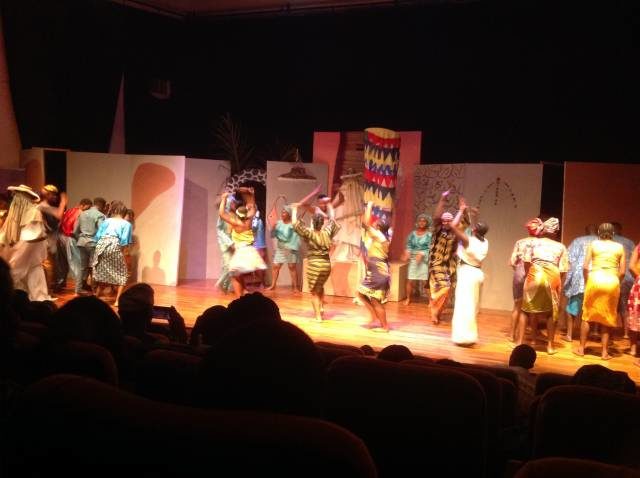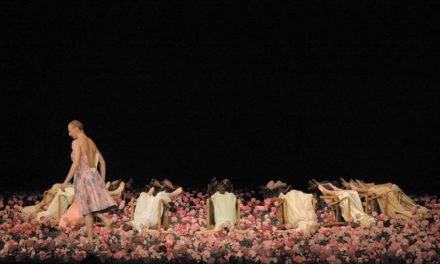A perfect blend of light, colours and humour. That is one of the most outstanding features of Isale Eko, a play co-produced by veteran broadcaster and show host Olisa Adibua and investment banker Joseph Edgar, which run in Nigeria in April.
Olisa Adibua set the ball rolling with his welcome address, in which he appreciated the Lagos state government, particularly Governor Akinwunmi Ambode, for the support given to the project as well as the adoption of the play into the ‘Lagos at 50’ celebrations.
Isale Eko tells the story of 14th century Lagos and its interactions with other kingdoms, highlighting significant events such as the slave trade, and a dynamic tussle for the throne that progresses from a clash between brothers to a dispute between families.
The story is also told through the abiding affair between a Prince, Kosoko (played by Nollywood actor, Femi Branch), and a captive Benin princess Osareya. Osareya also tickles the fancy of her master, Chief Eletu (played by Victor Okun).
As with most plays, there is a masterful infusion of dance riding on a delightful mix of traditional and contemporary songs capable of evoking multiple sensations.
In the opening scene, for instance, energetic dancers in variegated costumes shake to the rhythm of cultural tunes about Lagos as the centre of unity, excellence and harmony. The dancers effected a paddling a canoe scenario as the orchestra belted one of the tunes with a refrain “agbami la wa” loosely translated “we are on the sea.”
As entertained as I was by the sight of the dancers and the Eyo masquerades, I could not help but also think about the Otodo Gbame residents in their boats on the lagoon next to the ruins of their former homes, abodes destroyed by the state government.
As the dancers exit the scene after a thrilling performance, we are treated to a portrayal of a time in history when refusal to pay tributes to the Oba Igodomigodo in Benin earns the Aworis in downtown Lagos (Isale Eko) a threat of invasion and enslavement.
With a void left behind by Oba Eshinlokun who had gone to be with his ancestors, Chief Eletu and other chiefs of the Eko kingdom had the unenviable task of holding the kingdom together while Crown Prince Idehun Ojulari (played by Femi Durojaiye) and Prince Kosoko argue about control of resources and ownership of the slaves left behind by the dead king.
Fate hands Prince Ojulari the throne with a path to an unavoidable death, leaving the Queen Mother doubly bereaved. Prince Kosoko is thereafter cheated out of the throne by Akintoye (played by Yemi Sodimu) and in the moment building up to a major conflict over the throne, we are entertained with chants of “ajekun iya ni o je” – that traditional tune recently made popular by controversial Senator, Dino Melaye.
Prince Kosoko reclaims the throne from Akintoye and equally beats Chief Eletu to the love of the pretty slave, Osareya, who would later compel him to abolish slave trade in Isale Eko to retain her affection.
Osareya, in becoming Kosoko’s queen, however, more than earns her freedom. She also reunites the Eko and Benin kingdoms, extracting firm commitments from father and lover to end the slave trade, a pact that visibly angers Efunsetan Aniwura.
Due credit must be given to Williams Benson for writing and directing Isale Eko. It was a real beauty to watch from the first scene to the curtain call. The transitions were just as smooth as the dialogue with a careful infusion of Yoruba, Bini and a few other tongues without really losing the audience, save in a few instances with Efunsetan speaking entirely in a heavy Oyo dialect.
The cast of Isale Eko was top notch. Yinka Davies in her marginal role as Madam Tinubu helped drive the conflict to its climax, delivering her lines with class and rightly measured energy. Hafeez Oyetoro, popularly known as Saka, for a brief moment, stole the show, earning an overwhelming round of applause as he made his entry. His comic lines and dramatization also matched expectations.
Femi Branch was a perfect pick for a hot-headed Prince Kosoko, his bulky frame and scowls adding to the smooth delivery of his lines. His on-stage chemistry with Osareya was also a beauty to behold. Modeninuola who played the role of Aweni, also delivered excellently in playing Chief Eletu’s maid, temptress and informant.
In all, Isale Eko is an intriguing play about power, conflicting interests and romance in a 14th century Lagos which holds multiple values for entertainment, enlightenment and education on history and culture. It is recommended for all.
This review was originally posted at Olisa.tv. Reposted with permission. To read the original review, click here.
This post was written by the author in their personal capacity.The opinions expressed in this article are the author’s own and do not reflect the view of The Theatre Times, their staff or collaborators.
This post was written by Tobi Adebowale.
The views expressed here belong to the author and do not necessarily reflect our views and opinions.


















